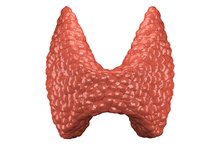What does fact checked mean?
At Healthfully, we strive to deliver objective content that is accurate and up-to-date. Our team periodically reviews articles in order to ensure content quality. The sources cited below consist of evidence from peer-reviewed journals, prominent medical organizations, academic associations, and government data.
The information contained on this site is for informational purposes only, and should not be used as a substitute for the advice of a professional health care provider. Please check with the appropriate physician regarding health questions and concerns. Although we strive to deliver accurate and up-to-date information, no guarantee to that effect is made.
Symptoms of High TSH Levels
TSH levels are important in determining thyroid health 2. TSH (thyroid stimulating hormone) is a hormone that the pituitary gland produces in varying amounts in order to stimulate the thyroid gland to produce hormones called thyroxine (T4) and triidothyronine (T3). Normal levels of TSH range from 0.4 to 4.0 mIU/L. TSH levels above 4.0 are considered high and result in a diagnosis of hypothyroidism. These high TSH levels occur when the pituitary produces more than normal amounts of TSH because the thyroid lags to produce T4 and T3.
Early Onset Symptoms
When TSH levels reach 2.0 mlU/L, the risk of developing hypothyroidism increases. At these levels, the condition is often called sub-clinical hypothyroidism. During sub-clinical hypothyroidism, patients may suffer subtle symptoms that are often attributed to normal factors, such as growing older or stress. These symptoms might include fatigue and mild depression.
- When TSH levels reach 2.0 mlU/L, the risk of developing hypothyroidism increases.
- During sub-clinical hypothyroidism, patients may suffer subtle symptoms that are often attributed to normal factors, such as growing older or stress.
Varying Symtpoms
Muscle Spasms With Thyroid Disorder
Learn More
The severity and combination of symptoms experienced with high TSH levels varies greatly from one patient to another. Some may suffer from just a few symptoms, while others seem to have every symptom when they experience high TSH levels. Because of the unpredictably of symptoms, regular blood tests are necessary to monitor TSH levels once diagnosed with hypothyroidism. Symptoms may or may not be present when levels rise.
- The severity and combination of symptoms experienced with high TSH levels varies greatly from one patient to another.
- Because of the unpredictably of symptoms, regular blood tests are necessary to monitor TSH levels once diagnosed with hypothyroidism.
Common Symptoms
High TSH levels can affect a person's overall outlook and mentality.
Myxedema Coma
What Is Low TSH?
Learn More
When hypothyroidism is left untreated, it can cause myxedema coma, which is a dangerous condition that results in loss of normal brain function and even death. Myxedema coma is rare, but it is most common in women and elderly hypothyroid patients whose thyroid condition is left untreated for an extended period of time. Incendence of myxedema coma increases during the winter months and in areas of extreme cold.
Symptoms During Pregnancy
Hypothyroidism is often diagnosed during pregnancy, as thyroid levels change greatly at this time. Testing TSH levels has become a standard part of pre-natal care, as even mild hypothyroidism during pregnancy can cause:
- pre-eclampsia
- increased risk of miscarrage
- anemia
- postpartum hemorrhage
- fetal cardiac dysfunction
- low birth weight
- even impaired development of brain function
Pregnant women, especially those with a history of thyroid issues, are encouraged to have their TSH levels monitored closely.
Hypotonia
Hypotonia is a muscle disorder that often accompanies hypothyroidism. Those who suffer from hypotonia have low muscle tone, reduced strength and are at a greater risk for ligament injury. Because people with hypothyroidism may have slowed reaction times in addition to an increased risk of hypotonia, patients should use extreme caution when participating in strenuous physical activity.
Related Articles
References
- Mayo Clinic
- National Institute of Health
- Biondi B. Thyroid and obesity: an intriguing relationship. J Clin Endocrinol Metab. 2010;95(8):3614-7. doi:10.1210/jc.2010-1245
- Hypothyroidism. American Thyroid Association.
- Safer JD. Thyroid hormone action on skin. Dermatoendocrinol. 2011;3(3):211-5. doi:10.4161/derm.3.3.17027
- Samuels MH. Psychiatric and cognitive manifestations of hypothyroidism. Curr Opin Endocrinol Diabetes Obes. 2014;21(5):377-83. doi:10.1097/MED.0000000000000089
- Saran S, Gupta BS, Philip R, et al. Effect of hypothyroidism on female reproductive hormones. Indian J Endocrinol Metab. 2016;20(1):108-13. doi:10.4103/2230-8210.172245
- Mathew V, Misgar RA, Ghosh S, et al. Myxedema coma: a new look into an old crisis. J Thyroid Res. 2011;2011:493462. doi:10.4061/2011/493462
- Rastogi MV, Lafranchi SH. Congenital hypothyroidism. Orphanet J Rare Dis. 2010;5:17. doi:10.1186/1750-1172-5-17
- Hashimoto's Thyroiditis. American Thyroid Association.
- Nada A, Mohamed ahmed A, Vilallonga R, Armengol M, Moustafa I. A giant euthyroid endemic multinodular goiter with no obstructive or compressive symptoms. Case Rep Med. 2011;2011:620480. doi:10.1155/2011/620480
- Anemia. Cleveland Clinic. Oct 25, 2017.
- Hanley, P.; Lord, K.; and Bauer, A. Thyroid Disorders in Children and Adolescents A Review. JAMA Pediatrics. 2016; 170(10):1008-1019.
- Maraka S et al. Subclinical hypothyroidism in pregnancy: A systematic review and meta-analysis. Thyroid. 2016;26(4):580.
- Ono Y, Ono S, Yasunaga H, Matsui H, Fushimi K, Tanaka Y. Clinical characteristics and outcomes of myxedema coma: Analysis of a national inpatient database in Japan. J Epidemiol. 2017 Mar;27(3):117-22.
- Samuels MH. Psychiatric and cognitive manifestations of hypothyroidism.Curr Opin Endocrinol Diabetes Obes.2014 Oct;21(5):377-83.
- Surks MI. (2017). Clinical manifestations of hypothyroidism. Ross DS, ed. UpToDate. Waltham, MA: UpToDate Inc.
- Tagami T et al. Multi-center study on the prevalence of hypothyroidism in patients with hypercholesterolemia. Endocr J. 2011;58(6):449-57.
Writer Bio
Liz Eubanks has been working as a writer and health researcher since 2006. Eubanks has a master's degree in social work and Bachelor of Arts degrees in international studies, Latin American studies and Spanish. Additionally, Eubanks has worked as a licensed massage therapist, has a certificate in holistic nutrition and is a devout yogi.




